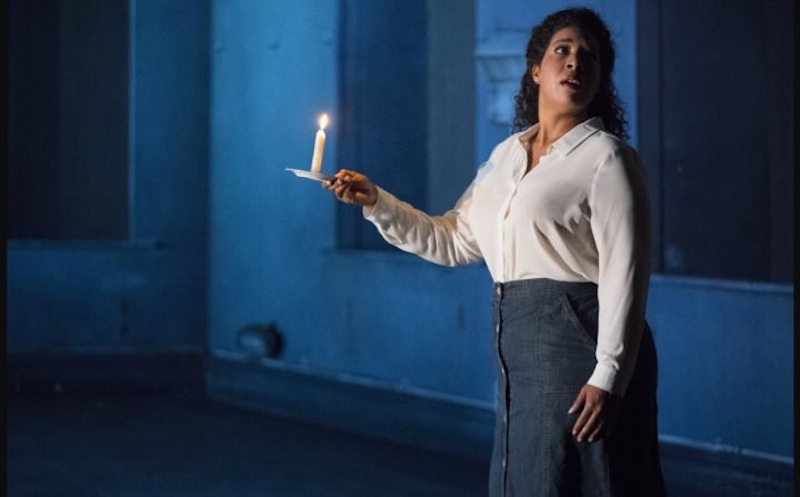Welsh National Opera – Macbeth
Wales Millennium Centre
Saturday 10th September 2016
It’s been 400 years since the passing of the Bard. Shakespeare, who never needs celebrating (because his work is always on) has had tremendous regards sent his way. If 2016 has not been the year of remembering Satie or Roald Dahl, it has most certainly been one for the Bard.
Here in Verdi’s first Shakespearian opera (he would later do Otello [Othello in Italian] and Falstaff), he conjures up a work that is obsessed by the tiniest details, including alterations and remonstrations for the librettist Francesco Maria Piave. It is one of the most successful of transformations, with the inspired idea of having the three witches massed into three sets of female choirs. The Italian translation is also very faithful to the language and beauty of the original verse.
Like a much latter addition to Greek tragedy, Macbeth is doomed before the get go. His triggers are the Witches prophesy, declaring him as King of Scotland, his wife’s callous contribution to assisting his murders and the apparitions which haunt him, including the famous dagger, Banquo at the dinner table and even young spirits conjured from up from a cauldron. Macbeth is a cautionary tale of gossip, mania and the corruption of power.
Thankfully, director Oliver Mears has faithfully kept the setting in Scotland, since the story is saturated within these locations. We see numerous banners and flags, tartan and kilts all over the stage, but the real question remains: is the production of worth? The answer is sadly, no. Opening the crisp new WNO programmes to Macbeth, a familiar image of miniature dunes in a warehouse from the film Stalker, is the front spread for this production. I questioned its presence in the brochure, with no explanation given at all. The only vague realisation is the staging felt partly influenced by Tarkovsky’s seminal film. If this was the case, it wasn’t apparent.
Here the witches are clearly marked as three sets, with bald heads, humps, floral frocks, silvery hair and skeletal bodies. The women of the WNO chorus are choreographed well, singing with exemplary gusto and even having the odd moment of humour. Their appearance feels more Dahl than Shakespeare and heaven knows we shall hear relentless things in Cardiff about the former shortly. The men are geared up in muddy contemporary soldier attire and Macbeth himself never seems to take it off.
Mary Elizabeth Williams is regularly the main attraction of any opera she graces at WNO. Cardiff has had the privilege of seeing her as Tosca and Abigale in Nabucco and to hear she’s soon to be Rosalinde in Die Fledermaus, leaves this fanboy in a flutter. Her take on playing the villainess Lady Macbeth is delicious, with audiences savouring her ecstatic singing and even the smother register of her vocal range. She tantalises us with plenty of arias and many other outstanding moments of movement and acting.
The huge collections of her fur coats and stilettos had me in titters and her “grieving” on the death of the murdered King Duncan is complimented with a ridiculously large bouquet of flowers, then pretending to faint, then tidying herself up and running off when everyone has gone. The first two acts are very much her’s, but we see little of her in the final two. Her only appearance here is her subtle and satisfying time as a sleepwalker, revealing all her murderous deeds, as she sings the famous “Out, damned spot!”, an obsessive moment of relentless hand washing the blood away.
One great element however, is the moody cloth seen during the scene and act changes: a monochrome sketch of Lady Macbeth, crudely drawn as if by Chagall on a bad day. The spot of blood, that haunts her, is here flicked on her face, as a black line slashes her face, declaring her fate. Now, this is worthy of an opera cloth.
The rest of the cast (Miklós Sebestyén’s heated Banquo a highlight) have little of the appeal as the treacherous Lady Macbeth. As the title role, Luis Cansino makes his WNO debut but leaves more of his acting qualities in the memory, than his decent baritone. The supporting cast prove their Verdi chops and have great moments of drama, but it is the production which fails them in moments of boredom, triviality and cliché.
Go see for the remarkable Lady Macbeth.
Rating: 3/5
WNO’s Shakspeare400 season continues with the UK premier of The Merchant of Venice by André Tchaikowsky, further performances of Verdi’s Macbeth and Cole Porter’s Kiss Me Kate.
From Weeping Tudor: “As a fundraiser for OCD UK, Weeping Tudor Productions is putting on an extended performance of Satie’s Vexations all around Cardiff starting in October till new year, with such venues as Cardiff University School of Music, Porter’s Bar and Cardiff Central Library.
“We are looking to gather together anonymous stories of OCD, or even just obsession. No more than a paragraph or two. Exceptions can be made if longer. No swearing or mature content.
“They can, of course, be published on TheSprout, too (can also be anonymous). TheSprout is offering Time Credits (a currency you may not have heard of) for anyone who does. A great chance to share your story (note: actors can read out your stories in concert, if you’d like).”
Photo Credit: Richard Hubert Smith
Related Articles & Info:
All Reviews
http://thesprout.co.uk/blog/2016/05/29/26516-review-wno-cavalleria-rusticana-pagliacci-wmc/
http://thesprout.co.uk/info/things-to-do/
Want a bit of this? Get involved:
Want to reach thousands of young Cardiffians? Submit your news here or register to become a contributor.
Want to become a reviewer? Join the Sprout Editorial Group on Facebook or email tom@thesprout.co.uk.
Click here for the next Sprout Editorial Group meeting:
Comment below:
It’s free and quick to comment below but we recommend signing up with your email or as a guest to keep usernames Sprouty and anonymous (and never post personal details!).
If you want more info on staying safe online, check out our online safety section.

